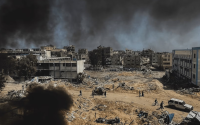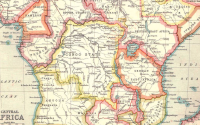13 August 2007Yahoo! News
North Korea late Monday said hundreds of people were dead or missing and thousands of houses destroyed in torrential rains which battered the country over the past week.
In a rare admission of problems within the reclusive country the North's official Korean Central News Agency said heavy downpours since August 7 had caused "huge human and material damage."
"According to the preliminary information available from different parts of the country as of August 12, the torrential rain left hundreds of persons dead or missing and destroyed more than 30,000 houses for over 63,300 families, or rendered them inundated," KCNA said.
"It also left tens of thousands of hectares (acres) of farmland inundated, buried under silt and washed away."
At least 800 public buildings, more than 540 bridges and sections of railway were destroyed in the heavy rain, the news agency said.
The southern provinces of Kangwon and North Hwanghae which border South Korea and South Hamgyong in the east were among the worst hit with thousands of families left homeless after their houses were inundated.
"The material damage so far is estimated to be very big. This unceasing heavy rain destroyed the nation's major railways, roads and bridges, suspended power supply and cut off the communications network," KCNA said.
Pyongyang and the neighbouring provinces of South Hwanghae, southwest of the capital, and South Phyongan to the north were also badly affected, it said.
In a separate dispatch, KCNA said many parts of the country received between 30 and 67 centimetres (about one to two feet) of rain between August 7 and 12.
"As a result, the farmland in those areas was inundated, washed away and buried under silt and dwelling houses, public buildings, production establishments and other objects were completely or partly destroyed," the agency said.
Experts say decades of reckless deforestation have stripped North Korea of tree cover that provides natural protection from flooding.
Energy-starved residents have used every scrap of wood from the countryside to cook food or heat homes through the bitter winters, leaving large areas of the country vulnerable to flooding and landslides.
Officials have worsened the problem by encouraging residents to expand farmland into the hillsides in a bid to grow more food.
Last year monsoon rains swept through much of the impoverished nation, killing hundreds of people.
Serious flooding helped trigger a famine in the mid-1990s in which aid groups estimate some two million North Koreans died.
A decade later the country is still unable to feed all of its 23 million people and depends heavily on outside food aid.






